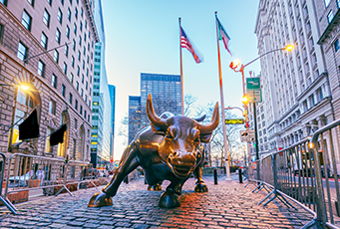
When people think about real estate, buying and selling homes generally comes to mind. However, in the investment world, real estate is generally dominated by office buildings, industrial warehouses, retail stores, and apartment buildings. Given that the real estate market had a significant downturn during the 2008 recession, how is real estate holding up during this pandemic?
Performance
There are two areas to watch in commercial real estate. First, you have the public markets. They are dominated by REITs, or real estate investment trusts. REITs generally trade just like stocks so you can buy and sell them all day, every day. Since REITs are incredibly liquid, you can see more volatility in them as investors get worried and head for the exits. In just over one month this year, Vanguard’s REIT Index ETF fell -44%. It has since rallied back and, while still negative, it is now down only -22% from its peak in February.
The second place to watch is the private real estate market. Private real estate prices differ because the investments are not publicly traded. Performance is generally updated every quarter. Instead of prices being driven by buyers and sellers, they are valued based upon the cash flow from the properties. As you might imagine, volatility is lower as it takes time for cash flows to change significantly. So far, we have not witnessed significant negative returns in the private real estate market as the last performance is from March 31. According to NCREIF, which has an institutional private real estate index, the private markets were up 0.71% in the first quarter of 2020. Only retail and hotels were showing negative returns in the first quarter of their index.
The Contrast of Public vs Private Real Estate Returns
Public markets are showing commercial real estate down -22% from its peak this year. But, the private commercial real estate market posted a positive return so far through the end of March. Which is a better reflection of real estate’s current investment performance?
Giving a closer look to private real estate performance, the first quarter only had a couple of weeks of virus impact. We should expect the second quarter to be much more volatile as April and May’s numbers are included. However, you will also include June’s numbers, which may be better if reopening for the country continues.
The Big Bet
At this point, the big bet is whether the economy and market are headed for a V-shaped recovery or some other letter-shaped recovery. The longer the recovery, the harder it will be for businesses and individuals to make their rent/lease payments.
So far, property owners have been willing to find creative solutions for cash strapped individuals and businesses to avoid defaulting on their leases/contracts. This is a win/win for now as there are no viable alternatives for property owners in the short term.
However, property owners generally have purchased their buildings using debt, and there are terms in their loan agreements regarding missed payments and cash flow issues. In the short run, both the property owner and their lender are on the same page with finding alternative solutions. The real question is, what happens if the recovery is drawn out? Do lenders and property owners become at odds during a more prolonged recovery?
We may see some of this begin to play out soon. Retailers are struggling as JCPenny goes into bankruptcy, and according to CNBC, the Mall of America, the biggest mall in the country, is behind on its mortgage payments by two months. There was also a report from the Seattle Times last week that Starbucks is asking its property owners for rent reduction for the next twelve months. The Starbucks news has not gone over well with property owners and certainly will be interesting to see how it plays out in the coming months.
Summary
Commercial real estate may provide much sought after answers in the coming months. As businesses and stores reopen, how quickly do their customers and clients return? Have their revenues picked back up? Does the government provide more financial assistance to businesses to cover rent/lease costs?
If conditions improve, we should expect REITs to lead the way in the recovery since they led the way down. If conditions do not improve, we should expect to see volatility start to present itself in the private real estate market, since it has yet to price in much negativity. Either way, following these markets may provide some valuable insight into what shape of a recovery our economy is taking.
Please remember that past performance may not be indicative of future results. Prior to implementing any investment strategy referenced in this article, either directly or indirectly, please discuss with your investment advisor to determine its applicability. Any corresponding discussion with a Bedel Financial Consulting, Inc. associate pertaining to this article does not serve as personalized investment advice and should not be considered as such.
Schedule a Consultation
We have helped our clients answer these questions and more. If you want a clear understanding of your financial future, and need help making changes to reach your goals, schedule a consultation and we can get started.
Recommended Articles
International Stocks: Exploring Global Investments
Investing in international securities offers an appealing...
Embracing Digital Innovation: Understanding the New Cryptocurrency Reserve
On March 6th, the Trump administration announced the...





